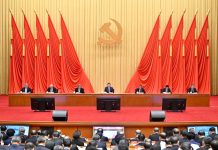BEIJING: The top legislature adopted a package of legislative changes to improve Hong Kong Special Administrative Region (SAR)’s electoral system on March 30.
The amended Annex I and Annex II to the Basic Law of Hong Kong SAR were passed at a session of the National People’s Congress (NPC) Standing Committee with all 167 committee members in attendance unanimously voting for it.
Annex I concerns the method to select the SAR’s chief executive while Annex II is about the method for forming Hong Kong’s Legislative Council (LegCo) and its voting procedures.
President Xi Jinping signed presidential orders to promulgate the amended annexes, which went into effect on March 31.
“A democratic electoral system suiting Hong Kong’s legal status and reality has taken shape as a result of the amendments,” Li Zhanshu, Chairman of the NPC Standing Committee, said while presiding over the session’s closing meeting.
Li said the two amended annexes demonstrate the resolution and common will of the Chinese, including Hong Kong compatriots, to safeguard national sovereignty, security and development interests as well as the constitutional order of Hong Kong.
The SAR’s Chief Executive Carrie Lam said in a statement on March 30 that by improving the electoral system and implementing the principle of “patriots administering Hong Kong,” the excessive politicization in society and the internal rift that has torn Hong Kong apart can be effectively mitigated, thereby enhancing its governance capability.
She said the SAR government will spare no effort to take the necessary amendments to the local electoral legislation forward in accordance with the amended annexes.
Empowering the Election Committee
The overall design of the system was centered around the reformation and greater empowerment of the Election Committee of Hong Kong.
The committee membership has been expanded from 1,200 to 1,500. The number of sectors has been increased from four to five. The number of subsectors has also been increased from 38 to 40, and some subsectors have been adjusted and improved based on the actual situation.
Apart from its original function of nominating and electing the chief executive, the committee will have two more key functions: electing a relatively large proportion of LegCo members and participating in the nomination of all LegCo candidates.
“With the enlargement, increased number of sectors, adjusted subsectors and renewed functions, the Election Committee will have a broader base and be more representative of society, leading to more balanced participation by people from all walks of life,” said Zhang Yong, deputy head of the Legislative Affairs Commission of the NPC Standing Committee.
Broader representation
The amendments also expand LegCo membership from 70 to 90. Of them, 40 will be returned by the Election Committee, 30 by functional constituencies and 20 by geographical constituencies through direct elections.
“The consideration behind this institutional design is that LegCo members returned by the Election Committee would represent the overall interests of Hong Kong society, those returned by functional constituencies would represent the interests of various sectors, and those returned by geographical constituencies through direct elections would represent the interests of their constituencies,” Deng Zhonghua, deputy head of the Hong Kong and Macao Affairs Office of the State Council, said.
The amendments scrap district council members’ seats in both the Election Committee and LegCo.
In recent years, district councils have seriously deviated from their functions and nature prescribed by the Basic Law, which stipulates that they are “district organizations which are not organs of political power” and may be consulted by the SAR government on district administration and other affairs, Deng said.
Funded by the government, district councils should concentrate on promoting the wellbeing of grassroots communities, provide valuable and constructive suggestions to the SAR government, and work as a bridge connecting the government with ordinary people, Deng added.
Vetting committee
According to the new annexes, a candidate eligibility review mechanism will be established to review and confirm the eligibility of candidates for the Election Committee, the office of chief executive and LegCo.
This is to ensure candidates meet not only the general eligibility requirements, but also the legal requirements and conditions for upholding the Basic Law and swearing allegiance to the SAR to implement the principle of “patriots administering Hong Kong,” Deng said.
Plugging loopholes and defects in Hong Kong’s electoral system and improving methods for the selection of its chief executive and the formation of LegCo in a systematic manner are the common aspirations of the Chinese people, including Hong Kong compatriots, the Hong Kong and Macao Affairs Office of the State Council said in a statement.
The office called on all sectors in Hong Kong to support the work of the SAR government and LegCo and create an optimal environment for various elections to be held on schedule.
Local residents have expressed staunch support for the improvement of Hong Kong’s electoral system.
A public petition launched in support of the legislative move received over 2.38 million signatures in Hong Kong.
According to a survey by local think tank Bauhinia Institute, nearly 70 percent of the 1,366 Hong Kong residents interviewed at random support the effort to improve the electoral system, and 66.8 percent agree on the composition of the Election Committee, saying it can better reflect the overall interests of Hong Kong society.
– The Daily Mail-Beijing Review News exchange item






